23 Common Human Foods Cats Can Eat
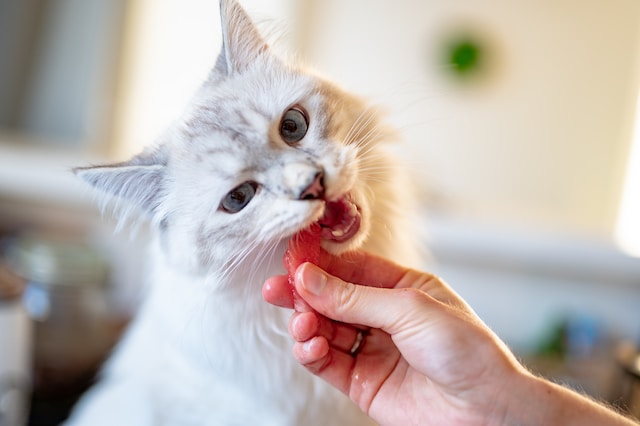
Let’s discuss some common human foods cats can eat…
Are you tired of constantly battling those pleading eyes whenever you sit down for a meal? Well, worry no more because we’ve got the scoop on human foods that are not only safe for your feline friend but also nutritious!
From fresh fish to yummy veggies, we’ve compiled a list of cat-approved treats that will have your furry companion purring with delight in no time. So, let’s dive in and discover the tasty world of human foods cats can eat!
Human Foods Cats Can Eat
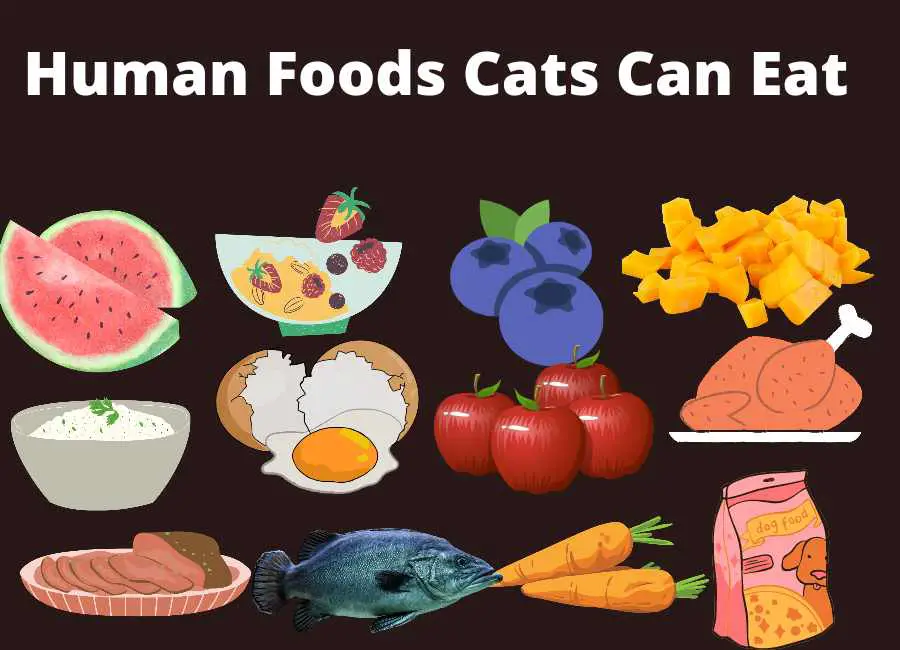
The following are some common human foods cats can eat:
1. Cooked Chicken
Cooked chicken can be a safe and beneficial addition to a cat’s diet. It provides a lean source of protein, which is essential for their overall health and well-being.
To offer cooked chicken to cats, it’s important to remove the skin and bones, as they can be harmful. The chicken should be thoroughly cooked and plain, without any seasonings or additives that could be toxic to cats.
It can be served in small, bite-sized pieces as an occasional treat or mixed with their regular cat food for added variety and nutrition.
2. Cooked eggs
Cooked eggs can be a beneficial addition to a cat’s diet. They are a good source of protein, which is essential for muscle development and overall health.
When offering cooked eggs to cats, it is important to ensure they are fully cooked to avoid any potential bacterial contamination. It’s best to offer eggs as a treat or as a supplement to their regular cat food.
3. Cooked Turkey
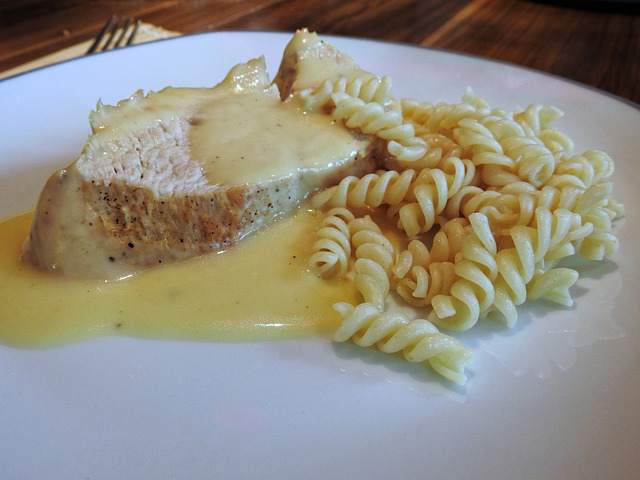
Cooked turkey can be a safe and nutritious human food for cats to consume. It provides essential proteins for their overall health and supports muscle development. However, it’s crucial to ensure the turkey is thoroughly cooked, boneless, and free from any seasonings or spices that may be harmful to cats.
To offer cooked turkey to cats, it’s recommended to shred or dice it into small, easily digestible portions, and serve it as a treat or mix it with their regular cat food in moderation. As with any new food, it’s advisable to introduce it gradually to monitor for any adverse reactions.
4. Cooked Beef
Cooked beef can be a safe and beneficial addition to a cat’s diet. It provides a good source of protein, essential amino acids, and vitamins such as B12 and B6, which are important for a cat’s overall health.
To safely offer cooked beef to cats, it should be thoroughly cooked, without any seasoning or additives, and served in small, appropriate-sized portions. It is essential to remove any bones, as they can pose a choking hazard or cause intestinal blockage.
5. Cooked Pork
Cooked pork can be included in the list of human foods that cats can eat, but it should be given in moderation. Pork is a good source of protein for cats, which is essential for their overall health and muscle development.
However, it is important to ensure that the pork is thoroughly cooked and free from any seasonings or additives that can be harmful to cats. When offering cooked pork to cats, it is advisable to remove any bones, fat, or skin, as these can pose choking hazards or cause digestive issues.
6. Cooked Salmon
Cooked salmon can be a safe and nutritious addition to a cat’s diet. It is a great source of protein and omega-3 fatty acids, which can promote healthy skin and coat, boost the immune system, and support joint health.
When offering cooked salmon to cats, it is important to ensure that it is boneless, skinless, and thoroughly cooked to avoid any potential risks of parasites or bacteria. It is best to serve it in small, bite-sized portions as an occasional treat or mixed with their regular cat food to provide variety and added nutritional benefits.
7. Cooked Oatmeal
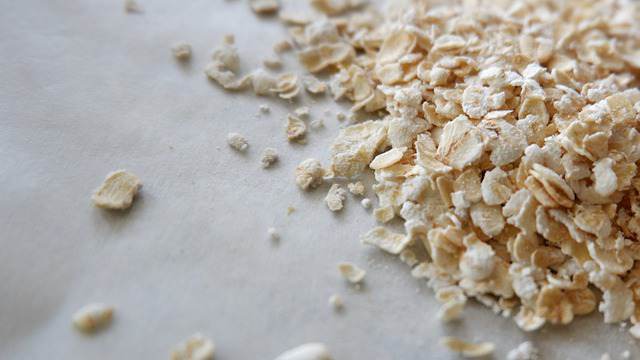
Cooked oatmeal can be a safe and nutritious addition to a cat’s diet. Oatmeal is a good source of fiber, which can aid in digestion and prevent constipation in cats. It also provides essential nutrients like vitamins B and E.
To offer cooked oatmeal to cats, it should be plain and unsweetened, without any added flavors or toppings. It’s important to let the oatmeal cool down before serving it to cats and to introduce it gradually to their diet to avoid any digestive upset.
8. Cooked Broccoli
Cooked broccoli can be a beneficial addition to a cat’s diet. It is a good source of fiber, vitamins, and minerals that can support their overall health.
However, it should be offered to cats in small, bite-sized pieces to prevent choking hazards. It is important to avoid seasonings, oils, or any other additives when preparing broccoli for cats, as these can be harmful to their digestive system.
9. Cooked Green Beans
Cooked green beans can be a safe and healthy addition to a cat’s diet. They are a great source of fiber, vitamins, and minerals, such as vitamin K and manganese. Green beans can aid in digestion and promote a healthy weight in cats.
To offer cooked green beans to cats, it’s important to ensure they are plain and free from any seasonings, oils, or additives. Green beans should be cooked until they are soft and easily chewed by cats and then cooled before serving in small, bite-sized portions.
10. Cooked Sweet Potato
Cooked sweet potatoes can be a safe and healthy addition to a cat’s diet. They are rich in fiber, vitamins, and minerals, which can support digestive health and boost the immune system of cats. When offering cooked sweet potato to cats, it is important to ensure it is plain and free from any seasonings or additives.
It should also be mashed or pureed to make it easier for cats to consume and digest. As with any new food, it is advisable to introduce cooked sweet potato gradually and monitor for any adverse reactions.
11. Cooked Rice
Cooked rice can be a safe and beneficial addition to a cat’s diet. It provides a source of carbohydrates and can be easily digestible for cats. Rice can help in relieving digestive issues and can be helpful for cats with sensitive stomachs.
To offer cooked rice to cats, it is important to ensure that it is plain and without any added seasonings or spices. Additionally, it should be served in small portions and mixed with the cat’s regular food to prevent any dietary imbalances.
12. Cooked Spinach
Cooked spinach can be a safe and nutritious addition to a cat’s diet. It is rich in vitamins A, C, and K, as well as folate and iron, which can support a cat’s overall health and immune system.
To offer cooked spinach to cats, it’s important to ensure it is thoroughly cooked and free from any seasonings, oils, or additives that may be harmful to cats. It should be served in small, bite-sized pieces to prevent choking hazards, and introduced gradually to a cat’s diet to avoid any digestive upset.
13. Cooked Carrots
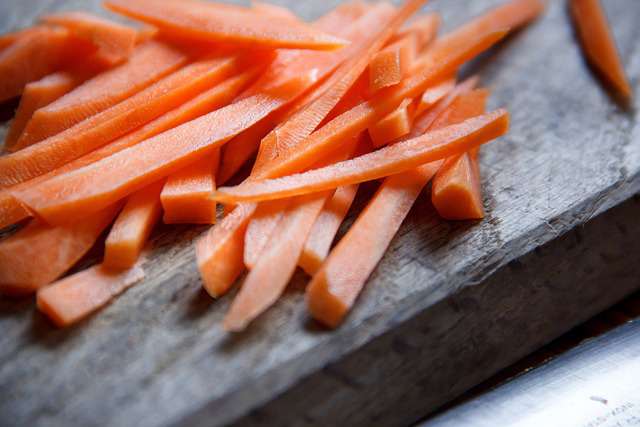
Cooked carrots can be a safe and nutritious addition to a cat’s diet. They are rich in vitamins A, K, and C, as well as fiber, which can support a cat’s overall health and digestion.
To offer cooked carrots to cats, it’s important to ensure they are fully cooked and soft, as raw or undercooked carrots can be difficult for cats to digest. It’s best to serve cooked carrots in small, bite-sized pieces as an occasional treat or mix them into their regular cat food to provide variety and added nutrients.
14. Cooked Pumpkin
Cooked pumpkin can be a safe and beneficial addition to a cat’s diet. It is a good source of fiber, which can help with digestion and prevent constipation in cats. Additionally, pumpkin is low in calories and can aid in weight management for overweight cats.
To safely offer cooked pumpkin to cats, it should be pureed and served in small amounts as a treat or mixed with their regular food. It is important to avoid using canned pumpkin pie filling, as it contains added sugars and spices that can be harmful to cats.
15. Watermelon
Watermelon can be a safe and enjoyable treat for cats when offered in moderation. It is a hydrating fruit that can help keep cats hydrated during hot weather. Additionally, watermelon is rich in vitamins A and C, which can support a cat’s immune system and overall health.
To offer watermelon to cats, remove the seeds and rind, and cut the fruit into small, bite-sized pieces. It’s important to remember that watermelon should only be given as an occasional treat and not as a substitute for a balanced feline diet.
16. Strawberries
Strawberries can be a safe and healthy treat for cats when offered in moderation. They contain essential vitamins, such as vitamin C, which can support a cat’s immune system. Additionally, strawberries are a good source of fiber, which can aid in digestion.
To safely offer strawberries to cats, it’s important to remove the leaves and stems, as they can be difficult to digest. It’s also crucial to slice the strawberries into small, bite-sized pieces to prevent choking hazards.
17. Blueberries
Blueberries can be a healthy addition to a cat’s diet as they are rich in antioxidants and vitamins. The benefits of blueberries for cats include promoting a strong immune system and reducing inflammation.
To safely offer blueberries to cats, it is important to wash them thoroughly and remove any stems or leaves. Cats should be given blueberries in moderation as a treat, and it is recommended to chop them into small pieces to prevent choking hazards.
18. Apples
Apples can be a healthy addition to a cat’s diet, offering several benefits. They are a good source of fiber, which can aid in digestion and help prevent constipation in cats. Apples also contain essential vitamins and minerals such as vitamin C, which supports a strong immune system.
To safely offer apples to cats, it is important to remove the core and seeds, as these can be choking hazards and contain trace amounts of cyanide. Additionally, apples should be served in small, bite-sized pieces and given as an occasional treat, as too much fruit can upset a cat’s stomach.
19. Cantaloupe
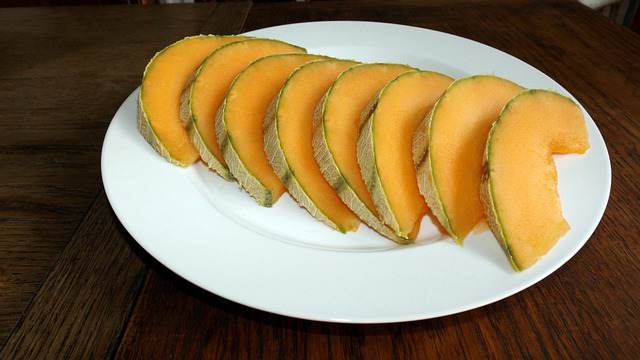
Cantaloupe can be a safe and healthy addition to a cat’s diet when offered in moderation. This fruit is a good source of vitamins A and C, which can support a cat’s immune system and promote healthy skin and coat.
To safely offer cantaloupe to cats, it is important to remove the seeds and rind, as they can be difficult for cats to digest. Cut the cantaloupe into small, bite-sized pieces and offer it as an occasional treat, or mix it with their regular food for added variety and nutrition. Always introduce new foods gradually and monitor your cat for any adverse reactions.
20. Bananas
Bananas can be a safe and healthy addition to a cat’s diet. They are rich in essential nutrients like potassium, vitamin C, and dietary fiber. These nutrients can support a cat’s overall health, aid in digestion, and promote a healthy heart.
To offer bananas to cats safely, it is important to peel and mash them into small, easily digestible portions. Moderation is key, as bananas should only be given as an occasional treat and not as a substitute for a balanced feline diet.
21. Bread
Bread can be included as a part of a cat’s diet, but it should be given in moderation. It can provide some nutritional benefits to cats, such as carbohydrates and fiber. However, it is important to note that cats are obligate carnivores, so bread should not replace their primary meat-based diet.
When offering bread to cats, it is crucial to ensure that it is plain and free from any seasonings, additives, or potentially harmful ingredients like raisins or garlic. Additionally, bread should be given in small, bite-sized pieces to prevent choking hazards and digestive issues.
22. Cooked Peas
Cooked peas can be a safe and nutritious addition to a cat’s diet. They are a good source of vitamins, minerals, and dietary fiber. Peas can help promote healthy digestion, aid in weight management, and provide a boost to the immune system of cats.
To offer cooked peas safely, ensure they are thoroughly cooked and properly cooled. Mash or puree the peas before serving to make them easier for cats to eat and digest. Start by offering a small amount to see how your cat reacts and monitor for any signs of digestive issues.
23. Cooked Shrimp
Cooked shrimp can be a safe and beneficial addition to a cat’s diet. Shrimp is a good source of lean protein, which is essential for a cat’s overall health and muscle development. When offering cooked shrimp to cats, it’s important to ensure it is plain, without any seasonings, butter, or oil, as these can be harmful.
Additionally, it’s crucial to remove the shell and tail to prevent any potential choking hazards. Moderation is key when introducing shrimp to a cat’s diet, as some cats may have sensitivities or allergies to seafood.
Learn more about human foods cats cannot eat.
Conclusion
In conclusion, it’s important to remember that while cats can enjoy some human foods, not everything on our plates is safe for them.
Treats like cooked chicken, salmon, and small amounts of cheese can be a tasty addition to their diet, but steer clear of foods like onions, garlic, and chocolate, as they can be toxic to our feline friends.
Always consult with your veterinarian before introducing any new foods to ensure your cat’s safety and well-being. Happy snacking, both you and your furry companion!
